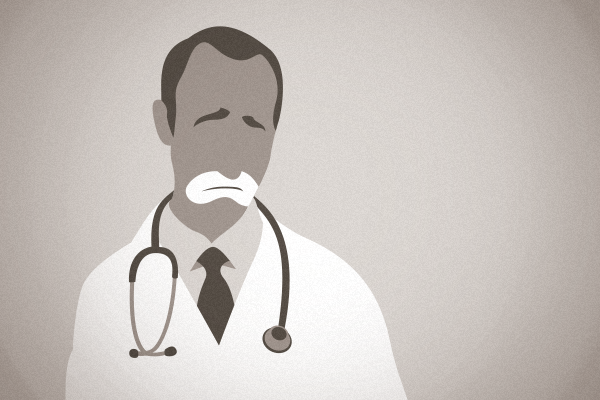Red Alert politics alerted us to this new Jimmy Kimmel sketch skewering Obamacare. We’re glad to know comedy has joined our crusade to get rid of tiresome bureaucracy, so doctors can focus on actual healthcare. Although, given the nature of comedy — the best humor is forward-thinking and offers social critique — healthcare has a long, long road ahead. At least certain public figures are pointing us in the right direction.

A Restaurant In L.A. Just Added Red Tape To Your Check
Republique is a fine dining establishment located in Hancock Park, a Los Angeles neighborhood. Because of Obamacare’s mandate that businesses with 50+ employees provide heatlhcare for ALL employees, they have unveiled an Obamacare “surcharge” tax. Currently, 3% of the untaxed bill is being added to customer tabs to cover the increased cost of their employee healthcare.
Dave Ramsey Does The ACA Math And It Doesn’t Add Up
If you’ve listened to the Dave Ramsey Show then you know Dave is a money guy with no formal political leaning (which is ironically political). However, this video segment walks through the oft-neglected common sense of Obamacare. Warning: he goes so far as to call the law communist. Regardless of the label, the math doesn’t work out. Our new healthcare law forces insurers to offer plans for flat rates, regardless of pre-existing conditions, and regardless of risk. Now while this is a noble moral imperative, it defies the ways that actuary tables ACTUALLY work. Meaning the only way for this type of setup to function is with higher premiums, to offset the added to insured groups.
STREAM: Concierge Medicine vs. Direct Care
We found this podcast from KPCC in Southern California and thought it was worth sharing with you. But not for the usual reasons. This episode takes a critical look at concierge medicine, asking, “Is concierge medicine pushing the nation’s doctor shortage over the brink? As the practice gets more affordable, is this a way for the uninsured to still get care? Is direct a la carte pricing a better way to bill patients for medical care?”

The Clash Of The Titans Or David & Goliath? Apple And Google Revolutionize Digital Healthcare
Bionic.ly put together a rather comprehensive list of Apple’s and Google’s digital healthcare milestones on their website. Even if you aren’t going to use or purchase all of them, it’s worth considering as we gain traction on the ever-changing healthcare landscape. For sure, it’s exciting. Startups are rushing to the market, both disrupting existing products — our Atlas.md EMR could definitely be considered a disruptive technology — and reifying existing problems e.g. digital EMRs that help doctors navigate exponentially crippling ICD-10 codes.

Healthcare Spending On The Decline
When we got to this article, we crossed our fingers that it wasn’t some slanted link bait. The New York Times is actually reporting that healthcare is already slowing down growth on the U.S. economy. Thank you, Obamacare! Healthcare has been a sector known to help the economy recover from recession. And now, it’s lagging behind. Some facts to consider courtesy of the Times:
White House Delays ACA’s Red Tape (With More Red Tape)
We love the smell of Red Tape in the morning. In Washington, The New York Times is reporting that the Obama administration announced on Monday that it would “postpone enforcement of a federal requirement for medium-size employers to provide health insurance to employees and allow larger employers more flexibility in how they provide coverage.” Wow, that’s such mouthful we couldn’t bring ourselves to paraphrase it. Let’s break it into smaller parts.

Happy Doctors Go With The Flow (And Cut The Red Tape)
Dr. Brian McDonough, Medical Editor of CBS Philadelphia, made a sad recommendation when he said, “Next time you see your doctor you might want to ask if he or she is happy.” Ouch. According to a study last year, 42% of docs admit they are ‘dissatisfied’ or ‘very dissatisfied’ in their medical practices, and 59% say they are unlikely to encourage a young person to go into medicine (talk about exacerbating the doctor shortage). Compare that with only 16% of physicians reporting a generally favorable outlook about their career future. Read more

17 Game-Changing Health Start-ups (And 5 Brought To You By Red Tape)
Inc.com claims you can find everything you need to know to start and grow your business now. They published a slideshow of 17 promising healthcare startups and we noticed some trends: fitness is big, which makes sense. If we get more people moving, we get fewer people coming in for preventative care — heart attacks, obesity, Type-II diabetes. However, we also noticed how much inspiration for entrepreneurship stemmed from red tape.
Here are some slideshow highlights:

A Slice Of Direct Care In New York City
NY1, a 24-hour cable-news television channel focusing on the five boroughs of New York City, aired a segment covering Dr. Muney’s direct care practice in New York City. AMG Medical Group charges $89/month for unlimited free visits — opening abscesses, laceration sutures — and even arranges for insurers to pay for services. It’s a little different than what we’re doing, but a great example of splitting the difference. That’s because Dr. Muney advocates wrap-around insurance coverage like us. One of his patients is so pleased with the service that he admits he’d be willing to pay the Obamacare tax penalty if he chose to forego his current catastrophic healthcare plan.
VIEW DR. MUNEY’S SEGMENT ON NY1 (Via Physician Tools)
Great news: AMG Medical Group operate offices in all five boroughs and Long Island. The practice has ~1,500 patients currently enrolled.